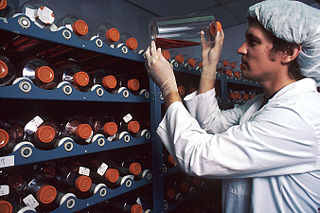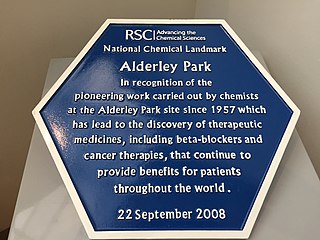Related Research Articles

The Wellcome Trust is a charitable foundation focused on health research based in London, in the United Kingdom. It was established in 1936 with legacies from the pharmaceutical magnate Henry Wellcome to fund research to improve human and animal health. The aim of the Trust is to "support science to solve the urgent health challenges facing everyone." It had a financial endowment of £29.1 billion in 2020, making it the fourth wealthiest charitable foundation in the world. In 2012, the Wellcome Trust was described by the Financial Times as the United Kingdom's largest provider of non-governmental funding for scientific research, and one of the largest providers in the world. According to their annual report, the Wellcome Trust spent GBP £1.1Bn on charitable activities across their 2019/2020 financial year. According to the OECD, the Wellcome Trust's financing for 2019 development increased by 22% to US$327 million.
The Medicines and Healthcare products Regulatory Agency (MHRA) is an executive agency of the Department of Health and Social Care in the United Kingdom which is responsible for ensuring that medicines and medical devices work and are acceptably safe.
Dr. Reddy's Laboratories is an Indian multinational pharmaceutical company located in Hyderabad, Telangana, India. The company was founded by Kallam Anji Reddy, who previously worked in the mentor institute Indian Drugs and Pharmaceuticals Limited. Dr. Reddy's manufactures and markets a wide range of pharmaceuticals in India and overseas. The company has over 190 medications, 60 active pharmaceutical ingredients (APIs) for drug manufacture, diagnostic kits, critical care, and biotechnology products.

Medical research, also known as experimental medicine, encompasses a wide array of research, extending from "basic research", – involving fundamental scientific principles that may apply to a preclinical understanding – to clinical research, which involves studies of people who may be subjects in clinical trials. Within this spectrum is applied research, or translational research, conducted to expand knowledge in the field of medicine.
The Industrial Technology Research Institute is a technology research and development institution in Taiwan. Founded in 1973, ITRI has played a vital role in transforming Taiwan's industries from labor-intensive into innovation-driven. Its open lab and incubator have fostered emerging industries and startups including well-known names such as UMC and TSMC. In addition to its headquarters in Hsinchu City, Taiwan, ITRI has branch offices in the U.S., Europe, and Japan in an effort to extend its R&D scope and promote opportunities for international cooperation around the world. In 1982, the new Materials Research Laboratories (MRL) was established under Industrial Technology Research Institute and Otto C.C. Lin was appointed as its founding Director.
The National Institute for Health and Care Research (NIHR) is the British government’s major funder of clinical, public health, social care and translational research. With a budget of over £1.2 billion in 2020–21, its mission is to "improve the health and wealth of the nation through research". The NIHR was established in 2006 under the government's Best Research for Best Health strategy, and is funded by the Department of Health and Social Care. As a research funder and research partner of the NHS, public health and social care, the NIHR complements the work of the Medical Research Council. NIHR focuses on several aspects of the research process, from translating laboratory findings to clinical research to applying the discoveries in health and social care.
The United Kingdom Space Agency (UKSA) is an executive agency of the Government of the United Kingdom, responsible for the United Kingdom's civil space programme. It was established on 1 April 2010 to replace the British National Space Centre (BNSC) and took over responsibility for government policy and key budgets for space exploration; it represents the United Kingdom in all negotiations on space matters. The Agency "[brings] together all UK civil space activities under one single management". It is based at the former BNSC headquarters in Swindon, Wiltshire.
The pharmaceutical industry in the United Kingdom directly employs around 73,000 people and in 2007 contributed £8.4 billion to the UK's GDP and invested a total of £3.9 billion in research and development. In 2007 exports of pharmaceutical products from the UK totalled £14.6 billion, creating a trade surplus in pharmaceutical products of £4.3 billion.

Alderley Park was a country estate at Nether Alderley, Cheshire, England, between Macclesfield and Knutsford. It was the residence of the Stanley family of Alderley from the 1500s. It became the headquarters of ICI Pharmaceuticals in the 1950s. It was purchased from AstraZeneca by Bruntwood in 2014. The site has an international reputation as a home for bio and life sciences.

LifeArc is a British life science medical research charity. It was established in 2000 as MRC Technology to translate the work of UK Medical Research Council (MRC) research scientists.

The Edinburgh Cancer Research Centre (ECRC), also known as the Cancer Research UK Edinburgh Centre and the University of Edinburgh Cancer Research Centre, is a center for basic, translational and clinical cancer research located in Edinburgh, Scotland. ECRC constitutes a part of the Institute of Genetics & Molecular Medicine (IGMM) and is positioned in direct proximity of the Western General Hospital, where most of its clinical activities take place.
Catapult centres are organisations set up from 2011 onwards by Innovate UK in the United Kingdom to promote research and development through business-led collaboration between scientists and engineers to exploit market opportunities. They receive grants from public funds but are also expected to seek commercial funding.
Dr. Stewart Sanders Adams was an English pharmacist, and bioengineer who was part of a team from Boots which developed the painkiller ibuprofen in 1961. Ibuprofen is now on the World Health Organization's Model List of Essential Medicines and is one of the world's best-selling drugs.

The Henry Royce Institute is the UK’s national institute for advanced materials research and innovation. Its vision is to identify challenges and to stimulate innovation in advanced materials research to support sustainable growth and development. Royce aims to be a "single front door" to the UK’s materials research community. Its stated mission is to “support world-recognised excellence in UK materials research, accelerating commercial exploitation of innovations, and delivering positive economic and societal impact for the UK.”

SomaLogic is a protein biomarker discovery and clinical diagnostics company located in Boulder, Colorado. It became listed on Nasdaq in September 2021 with a merger with the special-purpose acquisition company CM Life Sciences II, Inc.
The High Value Manufacturing Catapult is a group of manufacturing research centres in the United Kingdom, which forms part of the Catapult centres initiative.
The Connected Places Catapult is the UK government's innovation agency for cities, transport and place leadership. It is one of several Catapult centres.

COVID-19 drug development is the research process to develop preventative therapeutic prescription drugs that would alleviate the severity of coronavirus disease 2019 (COVID-19). From early 2020 through 2021, several hundred drug companies, biotechnology firms, university research groups, and health organizations were developing therapeutic candidates for COVID-19 disease in various stages of preclinical or clinical research, with 419 potential COVID-19 drugs in clinical trials, as of April 2021.

NHS Test and Trace is a government-funded service in England, established in 2020 to track and help prevent the spread of COVID-19. Despite its name, the programme was never in fact run by the NHS: the programme is part of the UK Health Security Agency; the service and the agency are headed by Jenny Harries.
References
- ↑ "Alderley Park to host medicines technologies Catapult centre". GOV.UK. Retrieved 16 July 2020.
- 1 2 "Medicines Discovery Catapult Limited". Companies House. Retrieved 16 July 2020.
- 1 2 3 4 5 6 "Medicines Discovery Catapult Limited: Annual Report and Financial Statements". Companies House. 31 March 2019. Retrieved 13 October 2020.
- ↑ "Additional responsibilities for Medicines Discovery Catapult". GOV.UK. Retrieved 16 July 2020.
- ↑ "UK Lighthouse Labs Network" . Retrieved 13 October 2020.
- ↑ "Catapult Backfires". Private Eye . No. 1530. 11 September 2020. p. 9.
- ↑ "Dr Robin Brown". Medicines Discovery Catapult. Retrieved 13 October 2020.
- ↑ "Chair appointed to Medicines Technologies Catapult". GOV.UK. Innovate UK. 18 January 2016. Retrieved 16 July 2020.